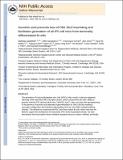| dc.contributor.author | Stadtfeld, Matthias | |
| dc.contributor.author | Apostolou, Effie | |
| dc.contributor.author | Chen, Taiping | |
| dc.contributor.author | Oi, Steen | |
| dc.contributor.author | Bestor, Tim | |
| dc.contributor.author | Ferrari, Francesco | |
| dc.contributor.author | Choi, Jiho | |
| dc.contributor.author | Walsh, Ryan Michael | |
| dc.contributor.author | Kim, Sang Yong | |
| dc.contributor.author | Shioda, Toshi | |
| dc.contributor.author | Park, Peter J. | |
| dc.contributor.author | Hochedlinger, Konrad | |
| dc.date.accessioned | 2013-05-09T17:21:03Z | |
| dc.date.issued | 2012 | |
| dc.identifier.citation | Stadtfeld, Matthias, Effie Apostolou, Francesco Ferrari, Jiho Choi, Ryan Michael Walsh, Taiping Chen, Steen Oi, et al. 2012. Ascorbic acid prevents loss of Dlk1-Dio3 imprinting and facilitates generation of all-iPS cell mice from terminally differentiated B cells. Nature genetics 44(4): 398-405. | en_US |
| dc.identifier.issn | 1061-4036 | en_US |
| dc.identifier.issn | 1546-1718 | en_US |
| dc.identifier.uri | http://nrs.harvard.edu/urn-3:HUL.InstRepos:10613631 | |
| dc.description.abstract | The generation of induced pluripotent stem cells (iPSCs) often results in aberrant epigenetic silencing of the imprinted Dlk1-Dio3 gene cluster, compromising the ability to generate entirely iPSC-derived adult mice ('all-iPSC mice'). Here, we show that reprogramming in the presence of ascorbic acid attenuates hypermethylation of Dlk1-Dio3 by enabling a chromatin configuration that interferes with binding of the de novo DNA methyltransferase Dnmt3a. This approach allowed us to generate all-iPSC mice from mature B cells, which have until now failed to support the development of exclusively iPSC-derived postnatal animals. Our data show that transcription factor–mediated reprogramming can endow a defined, terminally differentiated cell type with a developmental potential equivalent to that of embryonic stem cells. More generally, these findings indicate that culture conditions during cellular reprogramming can strongly influence the epigenetic and biological properties of the resultant iPSCs. | en_US |
| dc.language.iso | en_US | en_US |
| dc.publisher | Nature Publishing Group | en_US |
| dc.relation.isversionof | doi:10.1038/ng.1110 | en_US |
| dc.relation.hasversion | http://www.ncbi.nlm.nih.gov/pmc/articles/PMC3538378/pdf/ | en_US |
| dash.license | LAA | |
| dc.title | Ascorbic Acid Prevents Loss of Dlk1-Dio3 Imprinting and Facilitates Generation of All-iPS Cell Mice from Terminally Differentiated B Cells | en_US |
| dc.type | Journal Article | en_US |
| dc.description.version | Accepted Manuscript | en_US |
| dc.relation.journal | Nature Genetics | en_US |
| dash.depositing.author | Ferrari, Francesco | |
| dc.date.available | 2013-05-09T17:21:03Z | |
| dc.identifier.doi | 10.1038/ng.1110 | * |
| dash.authorsordered | false | |
| dash.contributor.affiliated | Walsh, Ryan M. | |
| dash.contributor.affiliated | Ferrari, Francesco | |
| dash.contributor.affiliated | Park, Peter | |
| dash.contributor.affiliated | Choi, Jiho | |
| dash.contributor.affiliated | Hochedlinger, Konrad | |


